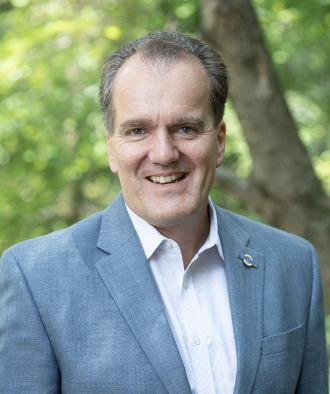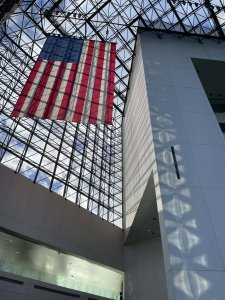My personal history is inherently international, as someone who had grown up in Germany and moved to the US first to study abroad and eventually for graduate school (a Ph.D. in Latin American history). But I had never traveled to any place on the Asian continent other than eastern Turkey! I had no clear expectations of what I would encounter in Taiwan. The only familiarity I had with East Asia was from general news coverage and conversation with my colleagues at the University of Mississippi, where I direct the Croft Institute for International Studies. The Institute’s program and faculty have a strong focus on East Asia: we offer Chinese, Japanese, and Korean as languages, require our majors to spend a semester abroad in the country where their chosen language is spoken, and host the Chinese Flagship program in our building.
We have long had Chinese language instructors from Taiwan, but it was not a country that our Institute focused on until the recent tensions between the US and mainland China when all of our student programs moved from China to Taiwan. I was curious to learn about this place struggling for political recognition. After the two weeks spent there with the International Education Administrators (IEA) seminar, I left truly impressed with Taiwan. Compared to the US South (where I live), Brazil (where I conduct research), and even Europe (where I grew up and my family still lives), Taiwan struck me as a technologically modern country that still has a sense of its traditions, a welcoming country that outsiders can be part of. These impressions may be superficial since we largely visited places that highlight the economic dynamism and the ambition to strengthen global connections, but there was a sense of positive energy.
The agenda for our twelve days in Taiwan was packed with visits to universities across the island, banquet meals one better than the next, and the occasional cultural outing to a night market, a museum, and Sun Moon Lake. The formal visits – whether at numerous universities, the Ministry of Foreign Affairs, or K-12 schools – were extremely structured, many of them focused on Taiwan’s goal for its Plan 2030 to strengthen Chinese-English bilingual instruction in its educational system. There was a lot to learn about that policy, but the high degree of formality in these meetings, together with the language barrier, often made it difficult to gain deeper insights. Even when there were brief opportunities for unscripted conversations, in often very brief roundtable conversations, the diversity of backgrounds on both sides made it difficult to discuss any topic in depth.
We knew little about our counterparts, and the same appeared to be true for the Taiwanese representatives of universities and schools. While I realize that busy schedules and the language barrier are realities, I wish that we had had more opportunities to interact with those local university representatives who could communicate key ideas and plans in English. It would have helped us – and them – to facilitate future exchanges and collaborations. The meetings were well-organized and we were treated extremely generously, but at times I could not help but wonder what their ultimate purpose was for the IEA group or for the hosting university. That purpose was clearer for some universities than for others: National Taiwan University (NTU), National Chengchi University (NCCU), Fu-Jen Catholic University (FUJEN), and China Medical University (CMU) stood out to me. Generally, the universities already most internationalized appeared to be best prepared to take advantage of the opportunity.
The interns or students that facilitated the visits and took us on tours of parts of their university were very enthusiastic, and I enjoyed their company. Those walk-throughs were opportunities to chat with them and to learn more about their goals – often an international degree – and their place in the structure of their university. This IEA seminar would have benefitted from more opportunities to engage informally with students and faculty: for my taste, it was too controlled and structured in a way that made such spontaneous conversation or open Q&A sessions very difficult if not impossible. There may have been an underlying rationale for the overall structure of the schedule, but it did not necessarily facilitate the kind of personal connections that international education exchange should be about.
Some of the most enjoyable and culturally significant moments on the trip came when we had opportunities to explore Taipei and other cities outside of the set seminar program. Strolling through night markets (Raohe Street Night Market in Taipei and Fengjia Night Market in Taichung) in smaller groups, tasting local foods, or visiting Taipei jazz clubs were the most authentic experiences, and I appreciate that Dr. Nadeau encouraged and facilitated them. Given how safe Taiwan is, by all accounts and our personal experience, incorporating more opportunities to venture out and explore would have been welcome. The great majority of the IEA group members had travel experience abroad, if not necessarily in East Asia or Taiwan, and would have liked to get to know this wonderful country more often on their own terms.
I do want to acknowledge that part of the programming decisions – and its controlled nature – may have been driven by the uncertainty of the COVID situation and restrictions on travel to Taiwan from 2020 to early 2023. While that was never made explicit, my understanding was that mask mandates had only been lifted a few weeks (or maybe months) before our arrival, and I assume that other travel restrictions were still in place when the program was designed. The size of our group, trying to give three cohorts of awardees a chance to complete their Fulbright Award, may also have contributed to the less flexible approach. I also understand that Fulbright required us to have a certain number of structured visits to fulfill the terms of the award. Still, I would suggest that this first post-COVID experience may offer an opportunity for the program directors in Washington/New York and/or Taipei to review the structure of this particular IEA.
Overall, my experience as part of the IEA group was wonderful. I met people in our group and at the hosting institutions who really care about the future of international collaborations generally and the potential of expanding relations with Taiwan specifically. In Mississippi, my home state, we are often rather isolated. Of the IEA seminar participants, I was the only one from the Deep South: the geographically closest co-participants were from Missouri, Southern Illinois, North Carolina, and South Florida. Building relationships with some of my fellow IEA travelers whose experience in international education greatly exceeds mine was eye-opening and will put me in the position to imagine more innovative programming at my university. As someone with a classic faculty career who branched out into administration relatively recently, I gained a much better sense of the strategic thinking that goes into building innovative programs and implementing sustainable internationalization.
It was striking to see how the wealth disparity between universities we know only too well from the United States, with Harvard’s per-student endowment at over $2 Mio. vs. $35,000 at my university, has certain parallels in Taiwan’s higher education system. Everybody spoke of NTU as the Harvard of Taiwan, and its international officer’s presentation certainly exuded great confidence about its future, while other universities clearly had financial limitations. Still, overall, higher education appeared to have a greater societal value and respect than in the United States at this moment in time, when politicians in many states compete to cut higher education funding without much awareness of the long-term consequences for US competitiveness. There was also a sense that the big questions of our time, starting with the prospect of dramatic climate change, are on the agenda in a way that they are not in the US.
These are the impressions of a first-time visitor, certainly very partial and probably somewhat romanticized, but I have told my family, friends, colleagues, and students that I would recommend Taiwan as a destination in East Asia. The selling point is not that Taiwan offers touristic or cultural highlights that one could not find – and more strikingly – in neighboring eastern and southeastern Asian countries, but there is something to be said for a cosmopolitan country that is genuinely welcoming and values education.
Thank you, Taiwan! Thank you, Fulbright!
Managing Editor: Tsai-Jen Wu 吳采臻





